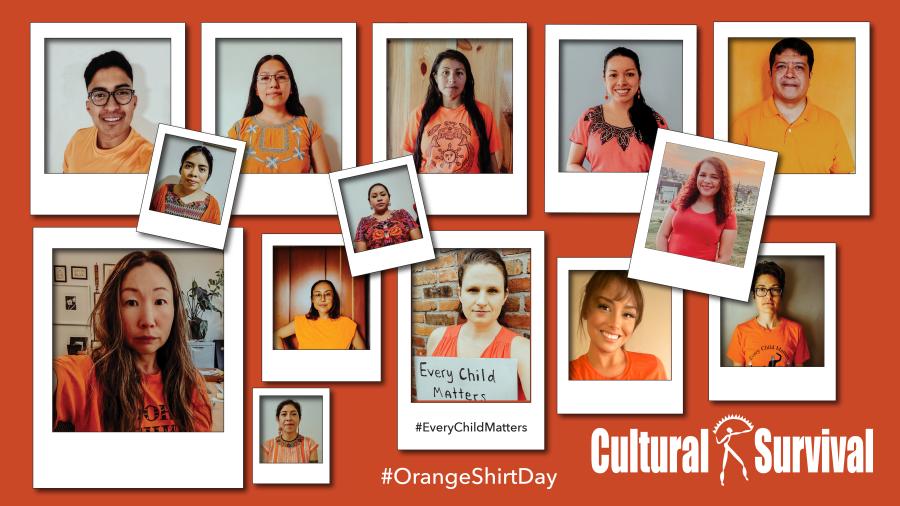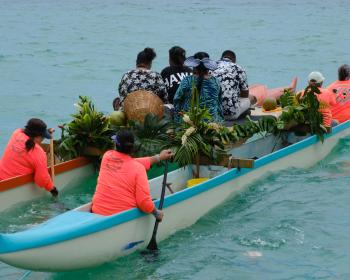The Curriculum Resource Program (CRP) at Cultural Survival is working with the Beaver Country Day School in Newton, Massachusetts. Students will learn and teach each other about the uniqueness of Buddhist ideals and beliefs in Tibet, and the subsequent political and religious constructions of the country. The unit will focus on the strength and survival of Tibetan culture before and since the Chinese invasion and engage students in the struggle for Tibetan autonomy. At the end of the unit, students will engage in a class debate, role-playing as Tibetans, the Tibetan administration in exile, international diplomats, and Chinese government officials by using position papers written from testimonies, Chinese documents, and interviews with local Tibetan and Chinese scholars. Students will participate in the debate engaging the Tibetan question from all sides and interests.
Cultural Survival 1998 Student Conference
Cultural Survival in Colombia
On May 27, the Curriculum Resource Program (CRP) at Cultural Survival, in association with ten regional schools will
Curriculum Resource Program
The Curriculum Resource Program at Cultural Survival develops multicultural educational materials designed to raise awareness about indigenous peoples, ethnic minorities, and human rights. The program works with teachers from local public, private, and essential schools, offering teachers and students first hand resources and the opportunity to work with an international human rights organization. Ongoing planning as part of the partnerships results in specific curricular materials, as well as an annual student conference. Please call the Curriculum Resource Program at (617) 441-5408 for more details. participate in a one day in-depth seminar for students grades 7-12 at the Harvard Graduate School of Education's Gutman Conference Center. The conference will have an interdisciplinary focus and objective that takes into consideration the anthropology, social studies, history, and Spanish classes that will be attending. The conference focuses on indigenous peoples in Colombia as they face proposed oil development on their lands.
Focus
Students will examine the complexities of the current situation of the U'wa people in Colombia as they struggle against U.S. and Colombian oil companies. Occidental Oil and Ecopetról seek to explore and exploit the reserves of the Bloque Samoré, land that belongs to the U'wa. The U'wa, ONIC (National Indigenous Organization of Colombia), and several environmental groups are opposed to oil exploration or exploitation of Bloque Samoré until Occidental and Ecopetrql prove that they can show respect for the U'wa and their rights to be involved in any decision-making processes that affect their land and communities. The groups also demand that oil companies take responsibility for the social and cultural impacts of their operations and to avoid the environmental disasters and ethnocidal policies practiced elsewhere in Colombia.
The Conference Program
Students will have the opportunity to engage the many aspects and opinions involved in this issue through discussion, interaction and role play. The morning will be devoted to the guest speakers: Dr. Ted Macdonald from Harvard University's Program on Non-Violent Sanctions and Cultural Survival, a group working with the Organization of American States to resolve the conflict, Berito Kubaruwa (Roberto Cobarma), President of the Traditional U'wa Authority, and Abadio Green, President of ONIC.
The Appear
The enormous interest and enthusiasm this conference has generated would not be possible without the support and participation of our members. The education program, the interest in Cultural Survival by teachers, the student conferences we sponsor, and the materials made available to teachers and students are all growing faster than we have the resources to develop and distribute them. Your support of the education program in the form of donations would ensure that the students conference materials can be made available to teachers and across the country.
During the afternoon, students will engage in small group discussions and role playing exercises to explore the issue as it relates to the different stakeholders' positions. Using primary and specifically written sources from Colombia and the U.S., students will learn to be critical about available media sources. Once the students have gained familiarity with the various perspectives and interests, they will work toward developing possible recommendations that would satisfy the U'wa, the oil companies, the Colombian government and the environmental organizations who are all involved with the issue.
The final portion of the program will concentrate on an activist project, advised through an exclusive Cultural Survival interview with Berito Kubaruwa and Edgar Mendez (Anthropologist, ONIC), which will give students the opportunity to directly assist the U'wa and give back to the community they have studied.
Article copyright Cultural Survival, Inc.



